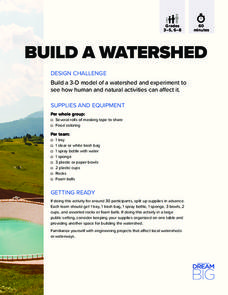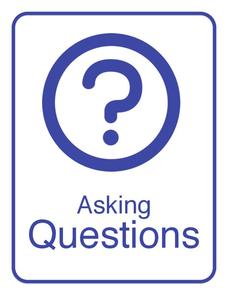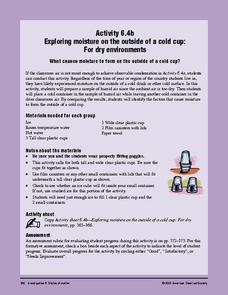Holland Patent Central School District
Moon Phases
Kids are fascinated by the moon for good reason! Here's a great resource to help them chart the lunar cycle for a month, referencing high-detail photographs and an informative chart as they complete their own calendar.
PBS
Teacher Planning Kits for New School Routines | End of Year
Support your end-of-year instruction with planning kits from PBS. Five planning kits are provided: Special Lessons and Collections; Planning Sheets for Pre-K through 5 and 6-12; Summer Bonus Resources; and Relevant Professional Learning...
DiscoverE
Build a Watershed
What's the best way to learn how watersheds work? Build one! Combining engineering, the water cycle, and ecology concerns, the activity is the perfect fit for an interdisciplinary unit. Teams construct a model watershed with simple...
Centers for Ocean Sciences
Ocean and Great Lakes Literacy: Principle 1
Is your current lesson plan for salt and freshwater literacy leaving you high and dry? If so, dive into part one of a seven-part series that explores the physical features of Earth's salt and freshwater sources. Junior hydrologists...
Bozeman Science
NGSS Practice Posters
Begin the year with an emphasis on the NGSS practice standards. The resource provides an 8x10 size poster for each standard. When hung in a classroom, learners have a consistent reminder of what it means to be a scientist.
Space Awareness
The Intertropical Convergence Zone
Young scientists know it is hotter along the equator, but why is it also rainier? Through the process of completing two experiments and a worksheet, scholars discover the answer is the intertropical convergence zone. First, they...
Walt Disney Company
Disaster Preparedness Activity Book
Join the American Red Cross as well as Mickey and friends as they help to prepare young scholars for natural disasters. After reading brief informational passages about earthquakes, floods, fires, storms, tornadoes, and hurricanes,...
Growing Classroom
Space Travelers
Groups of three scientists from the rocky planet Zog investigate the composition of soil so that they can take the information back to their home, create soil there, and begin to grow food.
NASA
The Science of the Sun
There's more to that glowing ball of light in sky than most children realize. From the overall structure of the solar system, to the changing of the seasons, these hands-on lessons open the eyes of young scientists to the important role...
NNF
Floods Happen
Did you know that flooding is the most common natural disaster in the United States? Prepare your learners with the facts about floods and offer them the proper knowledge and tools for dealing with this type of emergency.
American Chemical Society
From Gas to Liquid to Solid
From gas to liquid condensation to solid frost, water undergoes phase changes before learners' eyes! Using ice, salt, water, and a metal can, they set up an investigation that can be used in a physical science setting, or as part of a...
American Chemical Society
Exploring Moisture on the Outside of a Cold Cup: For Dry Environments
If the area you live in is arid, or the preceding experiment in this unit didn't yield obvious results, use this one in place of it to help reveal where condensation comes from. The mini unit that this is part of a comprehensive...
American Chemical Society
Condensation
It's time to break the ice! If you are doing all of the lessons in the unit, children have already seen that increasing heat increases the rate of evaporation, but is the opposite true? Does decreasing temperature cause more condensation...
American Chemical Society
Evaporation
This is one in several lessons that explore the relationship between temperature and phase changes of water. After some discussion, elementary physical scientists place wet paper toweling on a hot and a room-temperature water bag and...
Berkshire Museum
Where’s the Water?: Acting Out Science Cycles
Young scientists transform themselves into rivers, oceans, clouds, and drops of water in order to explore the water cycle. After assigning and explaining to learners their different roles in the activity, the teacher reads aloud a...
University of Wisconsin
Measuring Slope for Rain Gardens
The slope of the land is an important feature when considering the erosion that will occur. In this resource, which is part of a rain garden unit, learners calculate the slope of the proposed garden site. Even if you are not planning a...
Curated OER
My Weather Station
A printable weather station that will blow you away, this includes tools that little meteorologists can use to display their observations of daily weather conditions. There is a gauge where they can slide a pointer to show the...
Scholastic
Study Jams! Weather & Climate
Introducing your class to weather concepts is a breeze with this fresh film! It differentiates between weather and climate, describes the factors that affect weather (temperature, air pressure and humidity), and displays Earth's climate...
Institute of Electrical and Electronics Engineers
Filtration Investigation
Scholars build a simple filtration system to remove impurities from muddy water and rate the filtered water to a grade of clarity scale. The focus is on teamwork and problem solving. This instructional activity would be effective in your...
Baylor College
What Is the Water Cycle?
Small groups place sand and ice in a covered box, place the box in the sunlight, then observe as evaporation, condensation, and precipitation occur. These models serve as miniature water cycles and demonstrations of the three phases of...
Baylor College
Using Heat from the Sun
Let's heat things up! This simple experiment demonstrates for students the important role the sun plays in providing the earth with energy. Place one cup of water in direct sunlight and one in shade, then take measurements in order to...
Baylor College
Fossil Fuels and the Carbon Cycle
Humans are quickly depleting Earth's fossil fuels and locating them is becoming increasingly difficult! Layered muffins are used for models as young geologists take core samples in order to determine the presence of oil. Consider first...
Baylor College
Modeling Earth's Atmosphere
Life on Earth is made possible by the unique composition of its atmosphere. Working collaboratively, a scale model is created as young scientists learn about the different layers of gas that surround the planet. Cards are included that...
Baylor College
Measuring and Protecting Skin
Several subjects are addressed within the context of a science lesson about the sun's ultraviolet rays. Elementary earth scientists consider protection of the skin with sunscreens (health), estimating and measuring surface area or an...

























